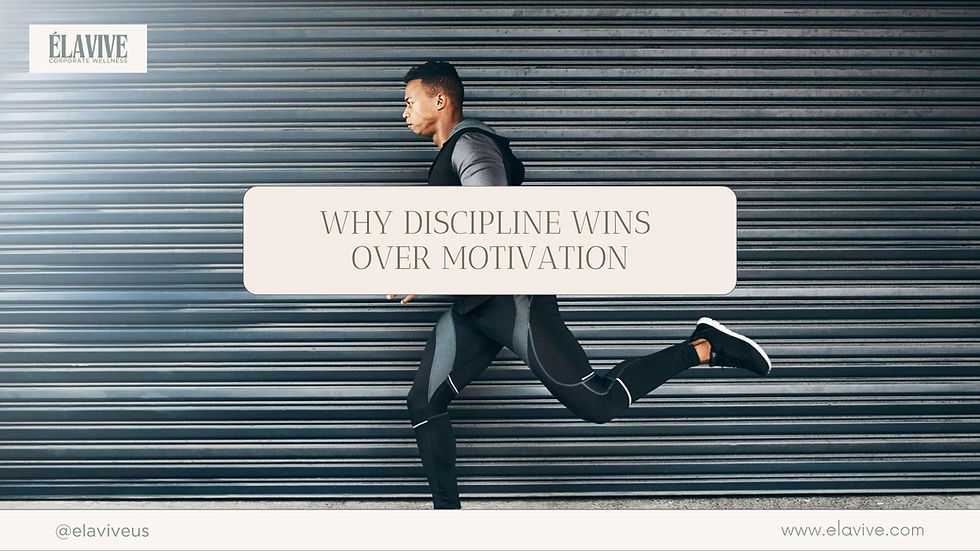Why Discipline Wins Over Motivation
- Jessica Lynn
- Aug 14, 2025
- 2 min read

When it comes to achieving goals—whether in business, fitness, personal growth, or creative work—most people overestimate the role of motivation and underestimate the quiet, unglamorous force of discipline. Motivation feels powerful, but it’s fleeting. Discipline, on the other hand, is what gets you across the finish line long after that initial spark has faded.
The Nature of Motivation
Motivation is an emotional state. It’s that surge of energy you feel when you first get excited about an idea—like starting a new wellness routine, launching a business, or writing a book. The problem? Emotions fluctuate. You can wake up one day feeling ready to conquer the world, and the next day, your enthusiasm has evaporated. Relying solely on motivation means your progress is at the mercy of your moods, energy levels, and circumstances.
The Reliability of Discipline
Discipline is action driven by commitment, not emotion. It’s showing up because you said you would, regardless of whether you feel like it. Discipline turns desired outcomes into habits by creating a structure that removes decision-making from the equation. You don’t ask yourself, “Do I want to work out today?” You work out because it’s on the schedule. You don’t wonder if you feel inspired to make sales calls—you make them because that’s what the plan requires.
Discipline thrives on consistency, and consistency is the true driver of results. You can be less talented, less experienced, and even less inspired than your competition—but if you show up and put in the work every single day, you’ll outlast and outperform them.
Why Motivation Can’t Go the Distance
It’s temporary: Motivation fades with setbacks, fatigue, and changing priorities.
It’s external-dependent: Many people rely on outside sources—podcasts, speeches, quotes—for motivation, which makes progress inconsistent.
It’s emotion-based: Since emotions are unpredictable, your progress becomes unpredictable too.
Discipline, in contrast, thrives in discomfort. It builds resilience because it requires you to act despite resistance.
How Discipline Builds Long-Term Success
Habit Formation: Repetition turns action into autopilot behavior. Once a habit is ingrained, it takes less mental effort to sustain it.
Progress in the Face of Resistance: When you expect hard days but follow through anyway, you prove to yourself you can handle more than you thought.
Compound Gains: Just as small investments grow with time, small disciplined actions stack up to create extraordinary results.
Blending the Two
Motivation isn’t useless—it can be the spark that ignites the fire. But discipline is the steady flame that keeps it burning. The most successful people use motivation strategically, letting it inspire new goals, while relying on discipline to execute them.
Bottom line: If motivation is the wind at your back, discipline is the engine that gets you there when the wind dies down. Build the habit of disciplined action, and you won’t need to wait for motivation to show up—you’ll already be moving forward.
Ready to make discipline your superpower?Whether you’re aiming for better health, sharper focus, or long-term success, a great coach can help you build habits that last.
Email us at info@elavive.com to book a 1:1 health coaching session or bring coaching to your team.
Thank you for reading.
We’re honored to support your commitment to a more intentional, balanced workplace.
Share this with a leader you admire — and remind them: wellness isn't a perk. It's a strategy.





Comments